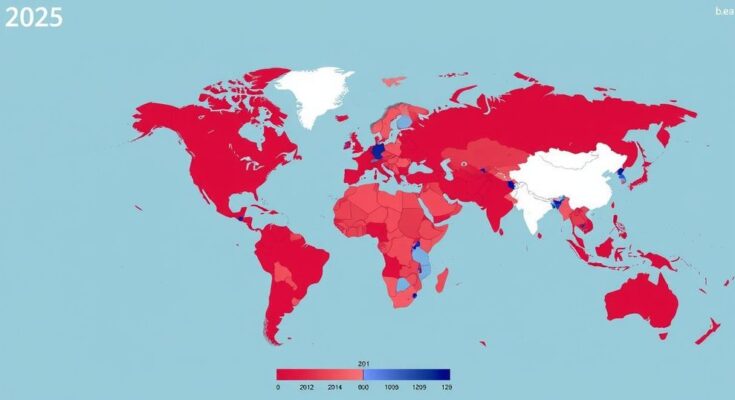In 2025, key elections in Belarus, Germany, Canada, Australia, and Egypt are anticipated to significantly impact their political landscapes. With notable challenges facing incumbents and various parties vying for power, these elections may lead to critical shifts in governance and policy direction.
In 2025, a significant number of elections are scheduled globally that could have profound impacts on political landscapes. With twelve confirmed elections, key races in Belarus, Germany, Canada, Australia, and Egypt stand out. These elections, occurring in pivotal contexts of political challenge and instability, will shape the direction of each country’s governance and party dynamics. The unfolding events in these regions will be closely monitored as they may signal broader shifts in international political alliances and ideologies.
The Belarus presidential election on January 26, 2025, is of particular note, as incumbent President Alexander Lukashenko seeks a seventh term amid continued opposition from figures such as Sviatlana Tsikhanouskay. Lukashenko, who has maintained power since 1994 despite facing significant dissent, recently secured lifetime immunity and legislative support, raising doubts about the election’s fairness.
Germany’s federal elections, set for February 23, 2025, will determine the members of the Bundestag following the collapse of the governing coalition. Incumbent Chancellor Olaf Scholz leads his party against a resurgent Christian Democratic Union. With current polling favoring the Christian Democrats and the far-right Alternative for Germany party gaining ground, the formation of the next coalition government will be a focal point.
In Canada, parliamentary elections are anticipated by October 20, 2025, amid discontent with Prime Minister Justin Trudeau, whose approval ratings have plummeted. Polls indicate a competitive landscape with Conservative leader Pierre Poilievre leading considerably. The potential for an earlier election remains, influenced by the opposition’s strategies.
Australia is approaching two significant election dates in 2025 — one for half of the Senate by May 17 and another for all House seats by September 27. Incumbent Prime Minister Anthony Albanese faces a challenge from Peter Dutton of the Liberal Party, as shifting voter sentiment may impact the outcome.
Finally, by December 2025, Egypt will hold elections for its parliamentary and presidential seats amid a climate of political repression, following President Abdel Fattah el-Sisi’s recent victory amidst limited competition.
Together, these elections in Belarus, Germany, Canada, Australia, and Egypt highlight the varied political challenges and transformations occurring worldwide. As the world watches, these elections pose the potential for significant alterations in both domestic and global politics.
The political landscape in 2024 saw substantial changes as incumbents were generally ousted in many countries. As we move into 2025, at least twelve elections have been confirmed worldwide, with significant implications anticipated from pivotal races. Countries such as Belarus and Germany are facing elections against a backdrop of political instability, while Canada and Australia are witnessing changing party dynamics. Egypt, too, is undergoing political scrutiny as its elections come into play.
The elections in 2025 are set to be monumental in shaping the political terrains of Belarus, Germany, Canada, Australia, and Egypt. The outcomes could redefine party dominance, influence public policies, and affect international relations. As voter sentiments evolve, watching these elections will yield insights into the future political climates across these nations.
Original Source: www.usnews.com




